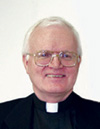
A Letter to the Catholic Church in China
Pope Benedict XVI addresses his June 30, 2007, letter to the one Chinese Catholic Church in which all have suffered
By Fr. David Warren, S.F.M.
July/August 2008
Return to Table of Contents
Print Article
China has a special place in the hearts of Scarboro missionaries. The Scarboro Foreign Mission Society was founded in 1918 for mission work in China. And from then to 1940, 53 Scarboro priests worked in China to spread the Christian faith. They endured the horrors of the Japanese invasion in 1937. During the Second World War, a number of Scarboro missionaries were interned by the Japanese. After the war, they endured the civil war between the Nationalists and the Communists. When the Communists came to power in 1949, a number of Scarboro missionaries were imprisoned or placed under house arrest, suffered interrogation, and were eventually expelled from China.
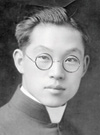 Scarboro Father Paul Kam
Scarboro Father Paul Kam
With the foreign missionaries gone, the new Communist government turned its attention to Chinese Christians. Church leaders – Protestant as well as Roman Catholic – were imprisoned. Among the priests who were imprisoned was Scarboro Father Paul Kam (inset) who happened to be a Chinese national. Fr. Kam spent a number of years in a labour camp. He died in 1959, his life shortened by the privations he had suffered. The Communist government also seized churches and institutions such as schools and
Control of the Churches
Realizing that it could not eliminate Christianity completely, the government set out to control the Churches through state – sanctioned and state – managed organizations. In the case of the Protestant Churches, the government sanctioned the Three Self Patriotic Movement that had been founded in 1950 for the purpose of creating a Protestant Church in China that would be "self-governing, self-supporting, and self-propagating."
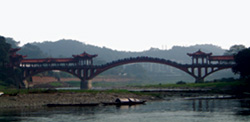
In the case of the Roman Catholic Church, the government sanctioned the Catholic Patriotic Association, created in 1957 by Roman Catholics who were sympathetic to the government. Among the initial members of the Catholic Patriotic Association were 10 Roman Catholic bishops and some 200 priests. They reasoned that the only way for the Church to survive was to cooperate with the government.
By 1958, 120 of the 144 dioceses in the People's Republic of China had no functioning bishop. The bishops of these dioceses were either in prison or in exile. In 1958 the bishops who had become members of the Catholic Patriotic Association began to consecrate new bishops without authorization from the Holy Father. Pope Pius XII responded with a declaration that these ordinations had been contrary to the law of the Church and were therefore "illicit." In spite of disapproval by Pope Pius XII and the subsequent popes, the bishops who belonged to the Catholic Patriotic Association continued to consecrate bishops without authorization from the Pope.
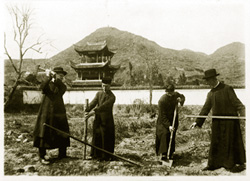 Monsignor John Mary Fraser (R) at the start of a building project, a church in Lungchuan, China, (1928) with (L-R) his brother, Fr. William Fraser, Fr. Paul Kam, and Fr. Ramon Serra. Msgr. Fraser founded Scarboro Missions (then known as China Missions) in 1918 to train and send priests to China.
Monsignor John Mary Fraser (R) at the start of a building project, a church in Lungchuan, China, (1928) with (L-R) his brother, Fr. William Fraser, Fr. Paul Kam, and Fr. Ramon Serra. Msgr. Fraser founded Scarboro Missions (then known as China Missions) in 1918 to train and send priests to China.
Most of the Roman Catholic bishops in China today belong to the Catholic Patriotic Association, but some have requested and have received secret confirmation of their consecration from the Holy Father. They are in secret communion with the Holy Father and, at the same time, they remain members of the Catholic Patriotic Association. To complicate matters still further, a number of bishops who are in secret communion with the Holy Father have received special permission from Rome to consecrate other bishops in secret.
In the 1950s, the Communist government legislated that all Protestant congregations must register with the Three Self Patriotic Movement and that all Roman Catholic congregations register with the Catholic Patriotic Association. Some congregations complied. Others did not. As a result, one group of Roman Catholics worships and functions publicly under the Catholic Patriotic Association while another group worships and functions secretly.
Pope Benedict's Letter
Because of Scarboro's roots in China, Scarboro missionaries were very interested in the letter of Pope Benedict XVI addressed on June 30, 2007, to the Roman Catholic Church in China.
It is significant that the Pope addresses his letter to "the bishops, priests, consecrated persons and lay faithful of the Catholic Church in the People's Republic of China." He makes no distinction between the "patriotic Church" and "the underground Church." He addresses the one Church in which all have suffered "painful or difficult experiences." But the Pope is also aware of "tensions, divisions and recriminations" within this single Church. For example, some Catholics who do not accept the Catholic Patriotic Association (CPA) sometimes accuse those who do accept the CPA of betraying the faith.
In his letter the Pope appeals to all Roman Catholics in China to forgive each other and to be reconciled with one another.
The Pope makes no recrimination against the Catholic Patriotic Association. But he does reiterate the position of his predecessors – going back to Pope Pius XII – that the Pope has the right to name bishops for China and that the consecration of bishops without the authorization of the Pope is contrary to the law of the Church.
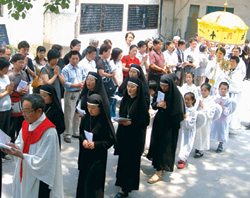 A 2006 Benediction procession at the Catholic Church in Lishui. Missionaries from the China Mission College (precursor to Scarboro Missions) first arrived in Lishui in 1926.
A 2006 Benediction procession at the Catholic Church in Lishui. Missionaries from the China Mission College (precursor to Scarboro Missions) first arrived in Lishui in 1926.
While the Pope addresses his letter to the Roman Catholic faithful in China, he speaks indirectly to those who govern the People's Republic of China. In his letter, the Pope assures the government of China that the Church does not exercise a political role and is therefore not a threat to the government of China. On the question of diplomatic relations between the Vatican and the People's Republic of China, the Pope expresses his willingness to enter into negotiations that will lead to the "normalization" of these relations. In 1951, the People's Republic of China had severed diplomatic relations with the Vatican. Since that time, the Vatican has enjoyed diplomatic relations with the Republic of China, which is based in Taiwan, but not with the People's Republic of China.
Religion and politics
Despite the Pope's assurance that the Church has no political ambition, the government of China can be forgiven for its misgivings. In the 1980s the bishops and priests of Poland led the opposition to Communist regime in Poland. The Vatican opposed the Sandinista regime in Nicaragua. In Latin America, Rome has appointed right-wing bishops. In the Philippines – right on China's doorstep – Cardinal Sin of Manila appealed to the faithful in February 1986 to go into the streets to stop the military from crushing the revolt against President Ferdinand Marcos. The leaders of the People's Republic of China may well agree with Mahatma Gandhi when he said that "those who say that religion has nothing to do with politics do not know what religion means."
The government of the People's Republic of China insists on the non-interference of outsiders in its internal affairs. It perceives the Pope and the Vatican as an outside power. At the same time, the government is determined to control every single group in China. China is a vast land with an immense population and the government fears chaos. Hence there is zero tolerance for dissent. The massacre in Tiananmen Square in 1989 and the continuing repression of the Falun Gong, a new religious group, are proof of that. China's concept of human rights is not the same as the concept in the West.
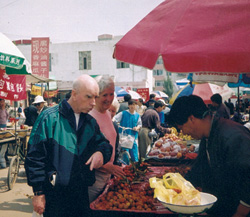 Fr. Brian Swords and former Scarboro missionary Jean Perry, a Sister of St. Joseph, in China. Today Scarboro missionaries are present in China as English teachers at the university level.
Fr. Brian Swords and former Scarboro missionary Jean Perry, a Sister of St. Joseph, in China. Today Scarboro missionaries are present in China as English teachers at the university level.
Just as the government of China insists on the non-interference of outsiders in its internal affairs, so the Vatican insists on the non-interference of the state – in China or anywhere in the world – in the Church's internal affairs. In his letter, the Pope reiterates the position expressed at the Second Vatican Council that the bishop of Rome is "the source and the foundation" of the unity of the world's bishops and that each local bishop must therefore be in communion with the bishop of Rome. However, Pope Benedict interprets "communion" in a restricted way. In his letter, he interprets "communion" as the right of the Pope to name bishops in China. In the early centuries of the Church, however, the bishop of Rome did not name other bishops but he would send them letters of recognition, and communion was expressed in this way. (In a similar way, recent popes have confirmed – albeit secretly – the consecration of a number of Chinese bishops belonging to the Catholic Patriotic Association.) Such was the general practice of the Roman Catholic Church in the Middle Ages. There are ample historical precedents for a local Church to choose its own bishop. Communion does not require that the Pope name local bishops.
An agreement on the naming of bishops is the key to the normalization of relations between the Vatican and the People's Republic of China. It is also the key to the reconciliation of the "patriotic" Catholics and the "underground" Catholics. In his letter, Pope Benedict expresses his hope that such an agreement can be reached.
Both the Church and the government of Beijing insist on non-interference in their internal affairs. The negotiations between Rome and Beijing will require sensitivity on both sides to the concerns of the other. While reserving its authority to confirm the nomination of bishops, Rome may have to allow the Church in China to nominate its bishops. Beijing, for its part, will have to show a greater willingness to recognize the human right to the freedom of religion.
There are indications that the Pope's letter has received a positive response from Catholics in China. As for the immediate response from the government, Xinhua (the official news agency of the People's Republic of China) reported that the Foreign Ministry had reiterated the government's long-standing demand that the Vatican sever diplomatic relations with Taiwan and that the Vatican agree not to interfere in China's internal affairs "in the name of religion." However, Xinhua also said that "China has made active efforts to improve relations with the Vatican, and will continue to have frank and constructive dialogues with the Vatican to settle the difference between the two sides."
This year marks the 90th anniversary of Scarboro's founding for work in China. Our history is deeply woven into the life of this great nation. With the Pope's recent letter, there are reasons to be hopeful.
Return to Table of Contents
Print Article